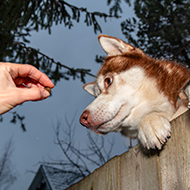
Charity pens open letter in response to recent debate in Westminster.
Animal welfare charity Blue Cross has expressed 'disappointment' over the government's non-committal response to legislation that would make pet theft a specific offence with custodial sentences.
The comments follow a debate in Westminster on Monday (19 October), during which MPs debated two petitions relating to pet theft, which had collectively received the backing of more than 300,000 people.
Ipswich MP Tom Hunt explained that more pets are being stolen 'just when we need their companionship the most'. But while the government said it was “keen to act”, it did not think that the creation of a specific offence “would really help much”.
In an open letter, the Blue Cross writes: 'Following the debate in parliament on Monday 19 October, Blue Cross is incredibly disappointed that the Government has not committed to change current legislation to make pet theft crime in its own right.
'We feel this is a huge missed opportunity to protect the lives of pets and reassure their owners that pet theft is taken as a very serious crime. Pets are not simply ‘property’ they are sentient beings and much-loved family members. Our Pet Bereavement Support Service has been supporting owners for over 25 years and we know only too well the devastation, stress and anxiety caused by the theft of a beloved pet which deserves to be recognised and thieves punished accordingly.
The letter continued: 'We are, however, encouraged that the Government has stated its willingness to engage in further discussion on the sentencing guidelines and we look forward to being fully involved.'
Speaking in Westminster on Monday, Mr Hunt said: “Covid-19 has made pet theft reform more pressing, not less. I promised campaigners in our virtual meeting this summer that I would try to secure this debate as soon as possible. There has been so much heartbreak during the pandemic, but we now have an opportunity to stop the theft of our beloved pets continuing to be part of it.
“I urge the Government to hear the petitioners and families across the country who are demanding justice. Our pets are always there for us. During this pandemic, they have been there for us more than ever. Now is the time to be there for them.”
He added that making pet theft a specific offence would elevate pet theft to a category 2 offence, and empower judges to hand out prison sentences of up to two years.
The debate was well-attended by several cross-party MPs who spoke passionately about the issue of pet theft and reiterated public supported for the issue.
MP Sheryll Murray, co-chairman of the all-party parliamentary group on cats, said it was 'time to bring in the right regulations to require the compulsory microchipping of owned cats.' She added that treating cats equally to dogs in the eyes of the law 'could massively help when it comes to prosecuting and proving pet theft.'
MP Peter Gibson welcomed the recommendation for vets to carry out routine scanning for new pets enrolled at their practices. He said: “These measures are for dogs, but we as a nation should be extending them to cats too. I concur with my hon. Friend the Member for South-East Cornwall (Mrs Murray) that there should be mandatory chipping for cats."
There has been a significant spike in pet thefts since the coronavirus lockdown began in March. According to the charity DogLost, raids on homes and kennels rose a staggering 65 per cent during lockdown to meet the demand for people wanting pets.
Currently, pets are treated in law in the same way as inanimate objects. This means that if someone is caught stealing a pet, they will likely be punished as if they had stolen a laptop or mobile phone, and receive a minimal fine.
Defra minister Victoria Prentis said: “We do not currently think that the creation of a specific offence for pet theft, with a two-year custodial penalty, would really help much. We think the way to go is to continue the discussions on sentencing guidelines.
“To that end, the Government are very willing to work with interested parties, including the police and animal welfare organisations. We are keen to act in this area, and I look forward to taking that forward with Members from across the House.”



 The latest
The latest